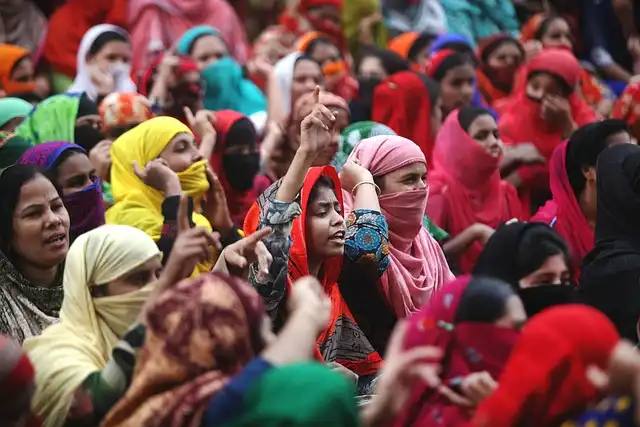Gangs’stories: From the streets of Dhaka to human-rights advocacy in Bangladesh

In addition, my research proposes that young people – like Sharif, who become involved in the lower echelons of these criminal enterprises, should be conceptualised as ‘illicit child labourers’ rather than gang members, which risks criminalising them, or as victims, which denies their agency and capacity to make choices.
Sharif after that finished up living on the roads at a train station in Bangladesh and came to be entailed with criminal gangs in order to survive. Sharif expanded closer to these groups, which were installed in wider Bangladeshi society and had connections with corrupt political leaders and the police.
The battle and its results were especially vital in Sharif’s upbringing. That was up until Sharif’s dad was killed by the Pakistani military previously in the war. At the age of 14, amid the turmoil and injury of war, Sharif left the family members home.
I only had one single t-shirt, yet it was torn in many locations. I had only one lungi however it was additionally torn in 2 places and I had to tie it with each other to maintain it from falling down. Whatever was completely unsure. If I handled one meal in a day, I felt like I had survived yet then we needed to consider the next meal, how to combat for that. To earn a meal a day was survival. We really did not have any kind of real plan, just to endure each day and get to the next one. That was our life then.
During these discussions, Sharif and I discussed his childhood and just how he conquered excellent misfortune, how war and dispute meant that he was required to survive on the roads at 14, leading him to come to be included with criminal gangs as a means to endure.
This article makes use of study partially moneyed by Dennis Rodgers’ “Gangs, Gangsters, and Ganglands: Towards a Global Comparative Ethnography” (GANGS) project, funded by a European Research Study Council Advanced Grant (no. 787935).
Our initial conference remained in July 2015. It became one of numerous, and the start of a significant working relationship and friendship. This connection came to be an important part of my doctoral study and, years later on in 2023, led to an exploration of Sharif’s life through hours of interviews as component of the GANGS Task.
In this post, Sally Atkinson-Sheppard worked closely with Sharif to compose the story of his journey from becoming a gang participant in war-torn Bangladesh to a human rights worker and supporter for road children’s civil liberties today. His tale is one of overcoming exceptional adversity and drawing on his past experiences to do great worldwide today.
There is also an additional aspect: the appearance of Bangladesh as a relatively brand-new nation. In 1971, West and East Pakistan engaged in a war referred to as the Bangladesh freedom battle, bring about the development of Bangladesh that very same year.
Sharif’s story obstacles a lot of the dominant motifs in gang research. Unlike typical stories, Sharif did not come from a household with a history of gang participation, neither was he bordered by physical violence. Instead, Sharif picked to leave his household home to support their survival in the after-effects of the 1971 Battle of Independence.
It’s the afternoon in Dhaka, Bangladesh. I am sitting in a workplace on the 4th flooring of a tower block in a northern part of the city. The window of the area is ajar, and I can hear Dhaka City grumbling below, the now familiar sound of automobile horns, rickshaw bells and individuals’s voices seeping right into the workplace. It is summer season and the air is hot, thick and suppressing, with dirt streaming in with the open window. Opposite me rests Sharif, a currently 60-year-old famous human rights worker and participant of my doctoral research.
College area, Dhaka. The mural offers the historic occasions from the Language activity of 1952 to the Triumph of Bangladesh in the Independence war against Pakistan in 1971. It has been created by musician S. R. Shamim.Ashfaq Mahmud/Wikimedia, CC BY-NC-ND
Throughout this time around, Sharif attempted to come to be a flexibility fighter– members of the Bangladeshi military, paramilitary and civilians who formed component of the resistance motion in the 1971 Battle of Self-reliance. But his age prevented him from joining them. On numerous events he was captured by the Pakistani military, he took a trip to India, tried access into evacuee camps, was questioned by the Indian cops and dealt with huge financial and emotional obstacles, consisting of coping with his sister’s capture and rape by the Pakistani military.
Sharif set out the various crimes committed by these gangs– robbery, burglary and extortion– and how affiliation with these teams permitted him to make an earnings. He explained hierarchies amongst the teams, with leaders, below leaders and prone youths, like Sharif, involved in the lowest tiers of these criminal business. Sharif explained how:
These teams still engage in a variety of criminal offense and physical violence, usually in partnership with the state. My doctoral study explores this partnership and inquiries extant concepts of gangs which are greatly stemmed from International North contexts. From a Global North lens gangs are street-based groups engaged in criminal offense and violence however distinctly different to ordered criminal offense. In position like Bangladesh, gangs are naturally connected with organised criminal offense and corrupt members of the state. On top of that, my research recommends that youngsters– like Sharif, who become associated with the reduced echelons of these criminal enterprises, should be conceptualised as ‘illegal child labourers’ rather than gang members, which runs the risk of criminalising them, or as victims, which refutes their firm and ability to make choices.
“Regrettably or fortunately I have some sort of foresightedness, I knew there was a various kind of life and points in the team came to be an increasing number of challenging. Each day there was some type of danger, from the police, or from the leader. There was always some concern with the police, usually since our leaders didn’t provide sufficient cash, then the cops would be truly impolite to us. If you wanted to leave the team the leader would certainly quit paying the police for defense of the member of the police and the gang would run after you. You finished up having to rejoin the group. I thought to myself: ‘Okay, if I want to leave the team then I have to leave this area’. And I did it. Luckily, a man helped me. He had actually lost 2 kids in the war of 1971; both had been killed by the armed force. He was so type to me, and I began living with his family members. He was a train motorist. My background from my life prior to the streets meant that I constantly review a lot, also when I was sheltering in the damaged trains, I check out old papers. That was something which offered me the insight of a different life.”
It is the leader’s work to get the young boys together and then to share the duty of that will certainly do what. There is a tiny leader of the group and afterwards bigger bosses. The orders originate from the older employers. The variety of older employers depends upon the component of town, state a part of the community has a leader and he has subgroups. Yet it relies on how big and financially feasible the area is.
“These prone kids, they do not have the opportunity to feel regret. They barely have time to assume. Now, as an adult all I do is think, think about today, tomorrow, think about what will take place to me and my family in 5-years’ time. When I lived on the streets, I can barely also see tomorrow. All I could focus on was my survival. What other choice did I have?”
Sharif’s tale obstacles several of the dominant motifs in gang research. Unlike typical narratives, Sharif did not come from a family with a history of gang involvement, neither was he bordered by physical violence. Sharif then finished up living on the streets at a railway terminal in Bangladesh and came to be involved with criminal gangs in order to survive. Sharif laid out the various criminal activities devoted by these gangs– extortion, burglary and burglary– and exactly how affiliation with these groups allowed him to gain an earnings. In addition, my study suggests that young individuals– like Sharif, who become entailed in the reduced tiers of these criminal ventures, need to be conceptualised as ‘immoral youngster labourers’ rather than gang members, which runs the risk of criminalising them, or as sufferers, which denies their firm and ability to make choices.
Sharif described just how, with the assistance of the train motorist, he handled to leave the roads and begin a new life. The process was unbelievably difficult, he had a hard time to make it through and invested months attempting to find his household. When he finally found them, Sharif slowly began to reconstruct his life. He returned to the family members home and looked for work. One of his initial jobs was functioning as a tutor. Sharif after that went on to study at institution and college, secured a task in the Bangladeshi federal government and ended up working for numerous NGOs. He currently functions as a famous civils rights worker and utilizes his experience to support in support of road kids and susceptible youngsters staying in Bangladesh.
The leaders do not survive on the streets, they live in culture, they provide sanctuary [security] to influential people. The leader is like a person in a circus, he commands every person to play. He is not playing himself on the streets, rather he is using the back screen. Many of those leaders are socially accepted and they are referred to as devoted to society, they do a whole lot for the society. Individuals in society give them shelter [defense] The leaders don’t get apprehended by the police; they are socially accepted.
Block sector is just one of the informal/unorganized markets in Bangladesh. This market is flourishing with the expansion of property organization. It is a labor intensive sector and susceptible to corruption and mafia interests.Dipankar Sarkar/Kalu Institute/Flickr
There is an immediate demand for much better awareness of this problem and much better security for these children. As Sharif discussed, they deal with extreme poverty, endemic misuse and have little control over their lives: “They undergo other individuals’s decisions”.
There are lots of parallels with Sharif’s tale, gangs and organised criminal activity in Bangladesh today. My recent study illustrates exactly how mafia-type groups controlled city locations in the past and continue to do so today.
“No one can discuss some of things [participation in crime] No one could become aware exactly how negative it was at the beginning, and just how much I have carried over in my next life from this experience, the sense of guilt, the discomfort. It is truly challenging for me to discuss; truly challenging for someone to understand.”
1 Council Advanced Grant2 Dennis Rodgers'
3 European Research Council
4 Global Comparative Ethnography
« Wikipedia’s un-‘reliable’ sources, Trump got crime trend correct and other commentaryExclusive | Inside Sean ‘Diddy’ Combs’ Hamptons sex parties, featuring ‘gay rappers’ who were ‘high on ketamine’: source »
